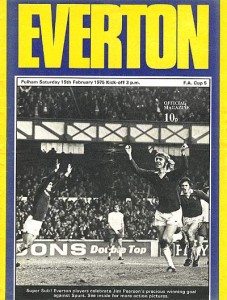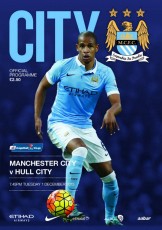 Manchester City moved into what was, pre-sponsorship by Etihad, the City of Manchester Stadium for the start of the 2003/04 season. City had spent 80 years at Maine Road prior to that and fans down the years would have had their pre and post-match rituals down to an art, a tradition passed down the generations – same place, same time, same friends and family.
Manchester City moved into what was, pre-sponsorship by Etihad, the City of Manchester Stadium for the start of the 2003/04 season. City had spent 80 years at Maine Road prior to that and fans down the years would have had their pre and post-match rituals down to an art, a tradition passed down the generations – same place, same time, same friends and family.
In moving ground losing those rituals for some City fans would have been unbearable and for those businesses that relied on match-day trade in Moss Side, financially catastrophic.
Those days getting to the ground amongst the back-to-backs in south Manchester have been replaced with a journey whether on foot, tram or car to a vast expanse called Sportscity, which includes City’s ground, a velodrome, an athletics stadium, the National Squash Centre and a link to the Etihad Campus (housing City’s Academy Facility).
It is an impressive site, yet what has this meant for the fan experience? With City drawn at home to Hull City in the Capital One Cup Fifth Round, it was an ideal opportunity to see for myself.
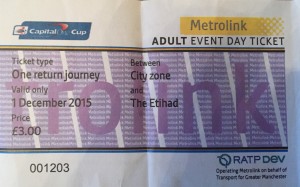 The Etihad Stadium sits to the east of the city centre and is easily reached by tram; tonight a £3 ticket provided a return ticket from Manchester Piccadilly to the Etihad Campus. It was then a short walk up a flight of stairs up to the exterior perimeter of the ground.
The Etihad Stadium sits to the east of the city centre and is easily reached by tram; tonight a £3 ticket provided a return ticket from Manchester Piccadilly to the Etihad Campus. It was then a short walk up a flight of stairs up to the exterior perimeter of the ground.
Given the space available, Manchester City have created various buildings and areas allocated with certain functions. So for instance, fans have the choice of the club shop, food and drinks outlets as well as City Square around the ground. This last space has a stage and is dedicated to providing pre-match entertainment, with interviews, competitions and live bands, which are beamed out on big screens around the stadium.
With the game being played on 01 December, it was a chance for the club to start the countdown to Christmas and had even installed an ice-rink outside the Etihad. Having arrived early it was a chance to experience the entertainment and facilities on offer. It was evident that City have put a great deal of time and effort into making sure that those arriving early are engaged, whilst of course ensuring they are spending money.
It may be a very different pre-match routine to that which many City supporters from the Maine Road era remember, but the reality is that for a new generation of fans, this is the norm – something the West ham faithful will have to come to terms with once they move to the Olympic Stadium next season.
Once inside the ground, you are struck by the fact that the concourses are bright and roomy with plenty of food and drink outlets and various television screens to continue the countdown to kick-off. As you would expect in a modern stadium, the seats are comfortable with plenty of legroom and a view free from any obstruction. They are facilities that are a lifetime away from those encountered in my early years of watching football around the country. However, there still remains a question as to whether these fine amenities in our fleet of all-seater stadiums have lessened the atmosphere in the game today.
 On the pitch, it was Manchester City who triumphed 4-1 over Hull City in a score line which flattered them. When Wilfred Bony slotted home after twelve minutes, one wondered if the game was going to be killed off by the Premier League side quickly. However, despite David Silva making his first start since early October and Belgian international Kevin de Bruyne being in the side, chances were few and far between in a low-key game.
On the pitch, it was Manchester City who triumphed 4-1 over Hull City in a score line which flattered them. When Wilfred Bony slotted home after twelve minutes, one wondered if the game was going to be killed off by the Premier League side quickly. However, despite David Silva making his first start since early October and Belgian international Kevin de Bruyne being in the side, chances were few and far between in a low-key game.
With just ten minutes remaining The Citizens were still ahead by a single goal as a few people started to head for the exits. Those leaving early missed four goals – on eighty minutes substitute Kelechi Iheanacho finished Raheem Sterling’s cross for City’s second and a third goal followed just two minutes later from De Bruyne. The Belgian added his second of the night on eighty seven minutes from a free-kick, which just left time for Andrew Robertson to score a consolation for The Tigers in time added-on.
At the whistle the 38,246 crowd dispersed into the cold December Manchester night, satisfied with a City win and progress into the Semi-Final. Whatever grounds have in terms of experience and facilities for fans in the future, some things they want will never change – a winning team.
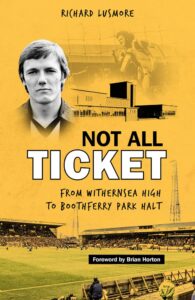 Set in the 1980s, Not All-Ticket: From Withernsea High to Boothferry Park Halt chronicles a dramatic period in the history of Hull City AFC through the eyes of a young fan from rural East Yorkshire.
Set in the 1980s, Not All-Ticket: From Withernsea High to Boothferry Park Halt chronicles a dramatic period in the history of Hull City AFC through the eyes of a young fan from rural East Yorkshire.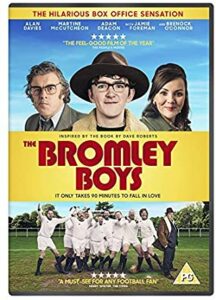
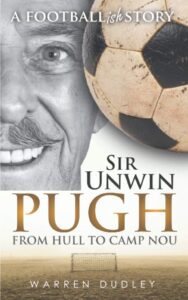 The author himself describes it as, “a comedy football autobiography about a 90 year old ex-player and raconteur called Sir Unwin Pugh. A bit Partridge, a bit Count Arthur Strong, a bit Ron Atkinson.” Traits from these three personas are presented to the reader, as Sir Unwin regals his life story against the background of an impending court case. Like Alan Partridge, Pugh is never afraid to promote his own worth and has something of the Little Englander about him, with his right-wing views evident through his story. Pugh also displays at times a pompous attitude with significant delusions about his abilities as a player and manager, and indeed his life in all aspects, features akin to the Count Arthur Strong character. In respect of Dudley’s nod to the much travelled ex-manager Ron Atkinson, Pugh comes to represent all the cliches that managers and pundits come to espouse in the game over the last few years. There are of course other influences, with this book also aiming an arrow firmly at the ‘boy-done-good’ football autobiographies.
The author himself describes it as, “a comedy football autobiography about a 90 year old ex-player and raconteur called Sir Unwin Pugh. A bit Partridge, a bit Count Arthur Strong, a bit Ron Atkinson.” Traits from these three personas are presented to the reader, as Sir Unwin regals his life story against the background of an impending court case. Like Alan Partridge, Pugh is never afraid to promote his own worth and has something of the Little Englander about him, with his right-wing views evident through his story. Pugh also displays at times a pompous attitude with significant delusions about his abilities as a player and manager, and indeed his life in all aspects, features akin to the Count Arthur Strong character. In respect of Dudley’s nod to the much travelled ex-manager Ron Atkinson, Pugh comes to represent all the cliches that managers and pundits come to espouse in the game over the last few years. There are of course other influences, with this book also aiming an arrow firmly at the ‘boy-done-good’ football autobiographies.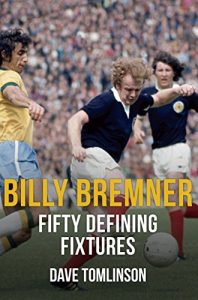
 Manchester City moved into what was, pre-sponsorship by Etihad, the City of Manchester Stadium for the start of the 2003/04 season. City had spent 80 years at Maine Road prior to that and fans down the years would have had their pre and post-match rituals down to an art, a tradition passed down the generations – same place, same time, same friends and family.
Manchester City moved into what was, pre-sponsorship by Etihad, the City of Manchester Stadium for the start of the 2003/04 season. City had spent 80 years at Maine Road prior to that and fans down the years would have had their pre and post-match rituals down to an art, a tradition passed down the generations – same place, same time, same friends and family. The Etihad Stadium sits to the east of the city centre and is easily reached by tram; tonight a £3 ticket provided a return ticket from Manchester Piccadilly to the Etihad Campus. It was then a short walk up a flight of stairs up to the exterior perimeter of the ground.
The Etihad Stadium sits to the east of the city centre and is easily reached by tram; tonight a £3 ticket provided a return ticket from Manchester Piccadilly to the Etihad Campus. It was then a short walk up a flight of stairs up to the exterior perimeter of the ground. On the pitch, it was Manchester City who triumphed 4-1 over Hull City in a score line which flattered them. When Wilfred Bony slotted home after twelve minutes, one wondered if the game was going to be killed off by the Premier League side quickly. However, despite David Silva making his first start since early October and Belgian international Kevin de Bruyne being in the side, chances were few and far between in a low-key game.
On the pitch, it was Manchester City who triumphed 4-1 over Hull City in a score line which flattered them. When Wilfred Bony slotted home after twelve minutes, one wondered if the game was going to be killed off by the Premier League side quickly. However, despite David Silva making his first start since early October and Belgian international Kevin de Bruyne being in the side, chances were few and far between in a low-key game.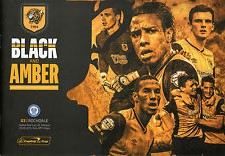 Following a first visit to
Following a first visit to  In terms of my impression of the KC Stadium, it was unspectacular from the outside, as most new-builds are, but it was good to see that had an attempt had been made to break up the plain exterior with a series of fresco’s featuring greats from Hull City and the rugby league legends of Hull FC (who also play at the KC Stadium).
In terms of my impression of the KC Stadium, it was unspectacular from the outside, as most new-builds are, but it was good to see that had an attempt had been made to break up the plain exterior with a series of fresco’s featuring greats from Hull City and the rugby league legends of Hull FC (who also play at the KC Stadium).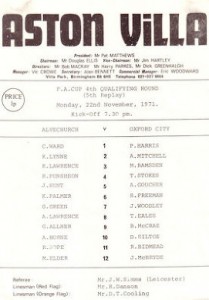 For me the reasons for the change in perspective of the FA Cup lay across the football community. The FA itself is complicit in damaging the competition in a number of ways. Firstly, there was the decision to allow Manchester United to opt out of the 1999/2000 FA Cup to take part in the revamped World Club Competition. This decision was part of the political gamble by the FA at the time, as they tried to sway FIFA in awarding England the hosting of the 2006 World Cup. And we all know how that worked out. Secondly, there was the ruling to have ties settled after a single replay (excluding the Semi-Final and Final itself). Personally, a major part of the glamour and thrill of the Cup was the odd occasions when a particular tie within a round went to a number of replays. As a Fulham fan I remember vividly the 1974/75 Cup run when we played Hull City three times to get through the Third Round and Nottingham Forest an incredible four times to make it through the Fourth Round. However, those Fulham fixtures were nothing compared to the record breaking fixture in 1971/72. Alvechurch played Oxford City in the 4th Qualifying Round. It required six games before Alvechurch emerged 1-0 winners. Sadly epic battles like that are a thing of the past. Thirdly, because of the burden of rebuilding Wembley Stadium, Semi-Finals now take place at the famous ground. This in my opinion also works to devalue the competition as the act of making it to Wembley and the Final are cheapened. Reaching a Final should be special. Certainly for me in 1975 seeing Fulham in the Final (despite defeat) was and is a treasured memory.
For me the reasons for the change in perspective of the FA Cup lay across the football community. The FA itself is complicit in damaging the competition in a number of ways. Firstly, there was the decision to allow Manchester United to opt out of the 1999/2000 FA Cup to take part in the revamped World Club Competition. This decision was part of the political gamble by the FA at the time, as they tried to sway FIFA in awarding England the hosting of the 2006 World Cup. And we all know how that worked out. Secondly, there was the ruling to have ties settled after a single replay (excluding the Semi-Final and Final itself). Personally, a major part of the glamour and thrill of the Cup was the odd occasions when a particular tie within a round went to a number of replays. As a Fulham fan I remember vividly the 1974/75 Cup run when we played Hull City three times to get through the Third Round and Nottingham Forest an incredible four times to make it through the Fourth Round. However, those Fulham fixtures were nothing compared to the record breaking fixture in 1971/72. Alvechurch played Oxford City in the 4th Qualifying Round. It required six games before Alvechurch emerged 1-0 winners. Sadly epic battles like that are a thing of the past. Thirdly, because of the burden of rebuilding Wembley Stadium, Semi-Finals now take place at the famous ground. This in my opinion also works to devalue the competition as the act of making it to Wembley and the Final are cheapened. Reaching a Final should be special. Certainly for me in 1975 seeing Fulham in the Final (despite defeat) was and is a treasured memory.